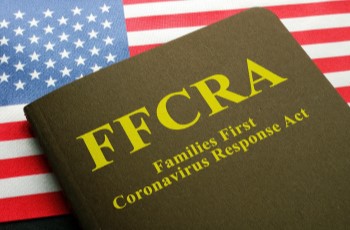
Motherhood Penalty and the Families First Coronavirus Response Act
Motherhood should never be considered a detriment in the workplace. Although during the pandemic, mothers have been dealing with harsh consequences across many industries. Have you heard of the ‘motherhood penalty’? There is no doubt that fathers also face a significant penalty particularly as relates to caring for their children.
What is the Motherhood Penalty?
This term refers to the disparities that mothers often suffer on the job — and have been attributed to the rise in workplace discrimination lawsuits throughout the United States. The motherhood penalty may come in a number of forms of discrimination in the workplace. This can include discrimination in hiring, firing, demotions, rate of pay, and promotions.
The motherhood penalty has also been used referring to pregnant women or women who have just given birth and/or are breastfeeding facing discrimination in the workplace. Employers who do not allow for reasonable accommodations such as in scheduling, going on recommended “light duty” for medical purposes, or allowing time for pumping breast milk at work, could be violating the law.
This term has risen to greater visibility with the increasing challenges facing women in the workplace during the coronavirus pandemic, where they have often been on the “frontlines.” A piece of important legislation was recently passed that addresses the motherhood penalty, the Families First Coronavirus Response Act.
What is the Families First Coronavirus Response Act?

The Families First Coronavirus Response Act (FFCRA) is administered by the U.S. Department of Labor and “requires certain employers to provide their employees with paid sick leave or expanded family and medical leave for specified reasons related to COVID-19.” It focuses on paid leave requirements that employers are legally bound to provide for their workers.
Generally speaking, the FFCRA directs covered employers to provide for all employees, except for employers of health care providers or emergency responders, the following:
- Up to 80 hours (two weeks) of paid sick leave at a regular rate of pay if the employee cannot work due to a government quarantine or if they are experiencing COVID-19 symptoms and seeking medical attentionOR
- Up to 80 hours (two weeks) of paid sick leave at two-thirds the regular rate of pay because of a bona fide need to care for an individual subject to quarantine or care for a child under 18 when schools or child care provider are closed due to Covid-19
- A person would need to be employed with a company for a minimum of 30 days to be qualified for additional relief under the Families First Coronavirus Response Act. This would be:
- Up to an additional 10 weeks of paid expanded family and medical leave at two-thirds the employee’s regular rate of pay; subject to the same parameters as above
It is important to understand what a covered employer means under the Act. The Department of Labor describes a covered employer as certain public employers and private employers with fewer than 500 employees. Small businesses under 50 may not be required to offer this if it jeopardizes the viability of the business. Most federal employees are covered under Title II of the Family and Medical Leave Act and not eligible for the FFCRA.
Obviously, larger employers such as big retailers, technology companies, and hospitality companies with more than 500 employees are not subject to the parameter of the FFFCA, but depending on the situation, they still can be held liable if they violate your workplace rights.
IMPORTANT NOTICE: The federal district court in New York struck down four provisions in the Department of Labor’s (DOL) Families First Coronavirus Response Act (FFCRA) regulations on August 3, 2020, four months after the regulations went into effect, and five months before the FFCRA is set to expire. State of New York v. U.S. Department of Labor, et al., No. 1:20-cv-03020 (S.D. N.Y. Aug. 3, 2020).
The four provisions struck down include:
- The definition of who qualifies for the healthcare provider exemption;
- The exclusion from benefits of employees whose employers do not have work for them;
- The requirement that employees secure consent for intermittent leave for certain qualifying reasons; and
- The requirement that documentation be provided before taking leave.
The court let stand the remaining provisions of the DOL’s regulations.
The court’s decision leaves open many questions. What is the definition of healthcare provider, and whether employees on furlough or who otherwise do not have work available (regardless of whether the employee is unable to work due to a COVID-19 issue) are eligible for pay.
The rules have changed. The implications of the court’s ruling are complicated and will be addressed in an updated blog post. The decision may be appealed and additional rulemaking will certainly follow. This is unchartered territory and reflects the haste with which the legislation was drafted and implemented. At this time, if you believe you may be covered and a violation of your rights may have occurred, we urge you to seek counsel.
Do I Have the Right to Sue for Being Subject to the Motherhood Penalty During the Coronavirus?
The short answer is yes. Discrimination in the workplace is wrong, and each employee should be treated fairly and equally, regardless of their parental status. Through the evolution of the crisis of the pandemic, employers have been attempting to keep revenue coming in, and many employees have suffered the consequences. Employers may be confused about the FFCRA or just willingly break this law or other laws that protect employees from workplace discrimination.
The motherhood penalty is, unfortunately, a common occurrence. This can be direct discrimination or due to unconscious bias. Regardless, being a mother should not make an employee be targeted for firing, being demoted, reductions in pay or benefits, or denied rightful promotions.
Wenzel Fenton Cabassa P.A. Takes on Employers That Penalize Mothers
If you are a Florida worker and believe that you have been the subject of the motherhood penalty at your job, we can lead the fight against your employer.
Workplace discrimination should never be tolerated. We honor mothers and advocate for their rights to equal protection under the law.
Contact us today to set up a free consultation. We work with you every step of the way and are dedicated to holding employers accountable for workplace violations and pursuing justice.
Please Note: At the time this article was written, the information contained within it was current based on the prevailing law at the time. Laws and precedents are subject to change, so this information may not be up to date. Always speak with a law firm regarding any legal situation to get the most current information available.








